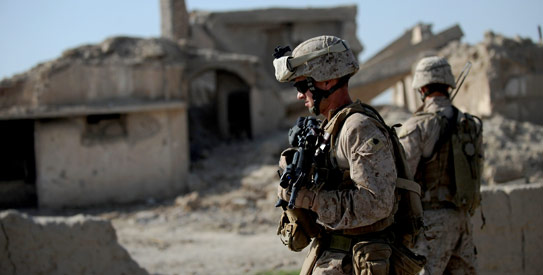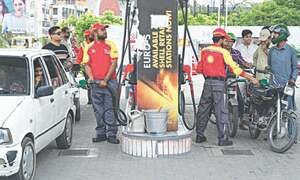
FOB DELHI: International troops in Afghanistan face the prospect of a spring offensive by the Taliban every year – but this time the US-led alliance believes it could mark a real turning point in its favour.
At Forward Operating Base Delhi in south Afghanistan's Helmand province, US troops are confident that as spring arrives in the coming days and weeks, they can match an expected Taliban fightback following recent coalition gains.
Some experts, however, believe that the rebels are changing tack to refocus their attacks on high profile civilian targets, as Afghan forces prepare to start taking control of security from foreign troops in some areas in July.
The military fight has been focused in the southern region – a major centre for opium production bordering Pakistan where insurgent leaders are believed to hide – with a surge of 30,000 extra US troops sent to Afghanistan last year.
“This is a critical time for him (the Taliban) but I think he's going to see the landscape dramatically different,” said US Army Colonel David Furness, in charge of troops in the key Helmand districts of Marjah, Garmsir and Narwar.
“He's going to find us better positioned this year to deal with him than last and he's going to pay for it.” US Defence Secretary Robert Gates, visiting Helmand on a two-day visit to Afghanistan last week, said the “acid test” of whether progress since the surge can be maintained would be in the coming weeks following a winter lull.
“The fight this spring and summer is going to be very tough. We expect the Taliban to try and take back much of what they've lost,” he told troops.
But some experts see a recent wave of suicide attacks in Afghan cities as evidence of a Taliban shift from the southern heartlands to urban areas in a bid to disrupt security transition plans, due to be completed in 2014.
Over 200 Afghan civilians have died in the last six weeks in a series of attacks across the country, which have notably targeted a supermarket and shopping mall in Kabul and a bank in the eastern city of Jalalabad.
The attacks on civilian targets come as Nato faces renewed criticism over civilian casualties caused during their operations from President Hamid Karzai, particularly after the recent deaths of nine children during an air strike.
Afghan security forces are also under increasing attack – on Monday, 36 people died in a suicide attack on an army recruitment centre in Kunduz province – the second attack on the centre in three months, and in the northern region that until recent months was relatively peaceful.
“The winter months are usually when Taliban fighters take a rest,” wrote Afghanistan and Pakistan expert Ahmed Rashid for the BBC this week.
“But as foreign forces enter a critical stage of their preparations for withdrawal from Afghanistan, the Taliban have stepped up the violence as part of a plan to destabilise the entire region.” The International Security Assistance Force (ISAF) in Afghanistan has also acknowledged that the Taliban is increasingly going after “soft targets, in other words civilians.” The impact of the heralded surge may have been inadvertently to push Taliban and other fighters out of the south and force them to concentrate on other targets, said Candace Rondeaux of the International Crisis Group think-tank.
“In many ways, the effect of the surge has been to push people northward towards areas where there is actually greater population density,” she said.
“Instead of having changes in the south, I think we'll probably continue along the same way – you'll probably have more violence in and around Kabul.” – AFP














































Dear visitor, the comments section is undergoing an overhaul and will return soon.